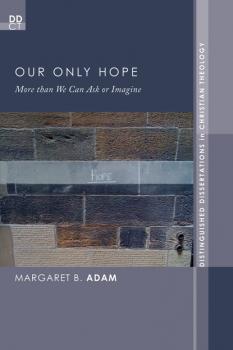ТОП просматриваемых книг сайта:
Distinguished Dissertations in Christian Theology
Скачать книги из серии Distinguished Dissertations in Christian TheologyАннотация
The most popular source of theological hope for American Christians is that of Jurgen Moltmann. Preachers, teachers, and lay people reflect Moltmann's influence, with their hope in a this-worldly eschatology and a suffering God. However, an exclusive reliance on that hope deprives the church of crucial resources in the face of global economic, environmental, and military crises. This book explores Moltmannian hope and considers its costs before looking elsewhere for additional contributions, from Thomas Aquinas's theological virtue of hope to nihilism and beyond, in order to encourage the church to sustain and practice hope in Jesus Christ, our only hope.
Аннотация
What is history and how does it impact biblical interpretation and theology? Allegorizing History seeks to begin answering this question by arguing that conceptions of the past and the purpose(s) of history impact biblical interpretation and vice versa. Furthermore, it is shown how philosophy and theology inevitably affect the understandings and practice of historical writing, thereby making all history figural or allegorical. Famous for his Ecclesiastical History of the Anglo-Saxon People and biblical commentaries, the Venerable Bede is studied in dialogue with Augustine, contemporary theology, and historical theory to make this interdisciplinary argument.
Аннотация
Parables–used by Jesus to reveal to us the kingdom of God, used to move us from being bystanders to active recipients of God's work of revelation–are constantly at risk of being buried as «mummies of prose,» as George MacDonald puts it. We become so familiar with the language of Scripture that Jesus' parables no longer work on us in this revelatory and transforming way.
George MacDonald, the Victorian poet and theologian, observed this very process at work in Victorian society. It was a culture saturated with Christian jargon but often devoid of a profound understanding of the gospel for its own time and culture. The language of Scripture no longer penetrated people's hearts, imaginations, and attitudes; it no longer transformed people's lives. MacDonald, called to be a pastor, turned to story and more specifically the «parabolic» as a means of spiritual awakening. He created fictive worlds in which the language of Jesus would find a new home and regain its revelatory power for his particular Victorian audience.
George MacDonald, the Victorian poet and theologian, observed this very process at work in Victorian society. It was a culture saturated with Christian jargon but often devoid of a profound understanding of the gospel for its own time and culture. The language of Scripture no longer penetrated people's hearts, imaginations, and attitudes; it no longer transformed people's lives. MacDonald, called to be a pastor, turned to story and more specifically the «parabolic» as a means of spiritual awakening. He created fictive worlds in which the language of Jesus would find a new home and regain its revelatory power for his particular Victorian audience.
Аннотация
The idea that covenant theology is profoundly influential in John Wesley's theological thought sounds dissonant. What would an evangelical Arminian have to do with a theological framework that historically belongs to a Reformed understanding of salvation? How could this possibly square with his ongoing controversy with the Calvinism of his day? On the basis of compelling evidence from his sermons and correspondence, this investigation dares to push through the impulse to dismiss the idea that covenant theology belongs to the infrastructure of Wesley's thought. The resulting discovery of its role in shaping his narrative of the way of salvation is surprising and intriguing. Wesley is not only informed and fluent with respect to covenant theology, but thoroughly committed to it. This study demonstrates that, with theological precision and discernment, Wesley appropriates covenant theology in a way that is consistent both with its primary theological features and with his Arminianism. His distinctive view of «the gradual process of the work of God in the soul» supplies valuable grist for further reflection, especially by those charged with the care of souls in the twenty-first century
Waiting at the Foot of the Cross - Pamela R. McCarroll
Distinguished Dissertations in Christian TheologyАннотация
How do we hope in the face of modernity's failure and postmodernity's absence of foundations? How do we hope when the future seems fearful and no clear way forward appears? How do we hope when despair, indifference, and cynicism dominate the psychic landscape of English-speaking North America? In dialogue with theologians of the cross George Grant and Douglas John Hall, this book unmasks the failure of hope in our time and the vacuum of meaning that remains. As an exercise in the theology of the cross, Waiting at the Foot of the Cross explores the North American context as one in which true hope is discovered only when life's negations are engaged from a posture of waiting trust. Such hope is not passive or blind. Rather, it is attentive, active, open, and spiritually grounded in the One who meets us when all hope is spent. The final chapter proposes a way toward hope for today that inspires subversive resilience in the face of the ambiguities and vicissitudes of life. Readers interested in the theology of the cross, in thinking theologically in our time and place, and those interested in the character of Christian hope will find this book compelling.





